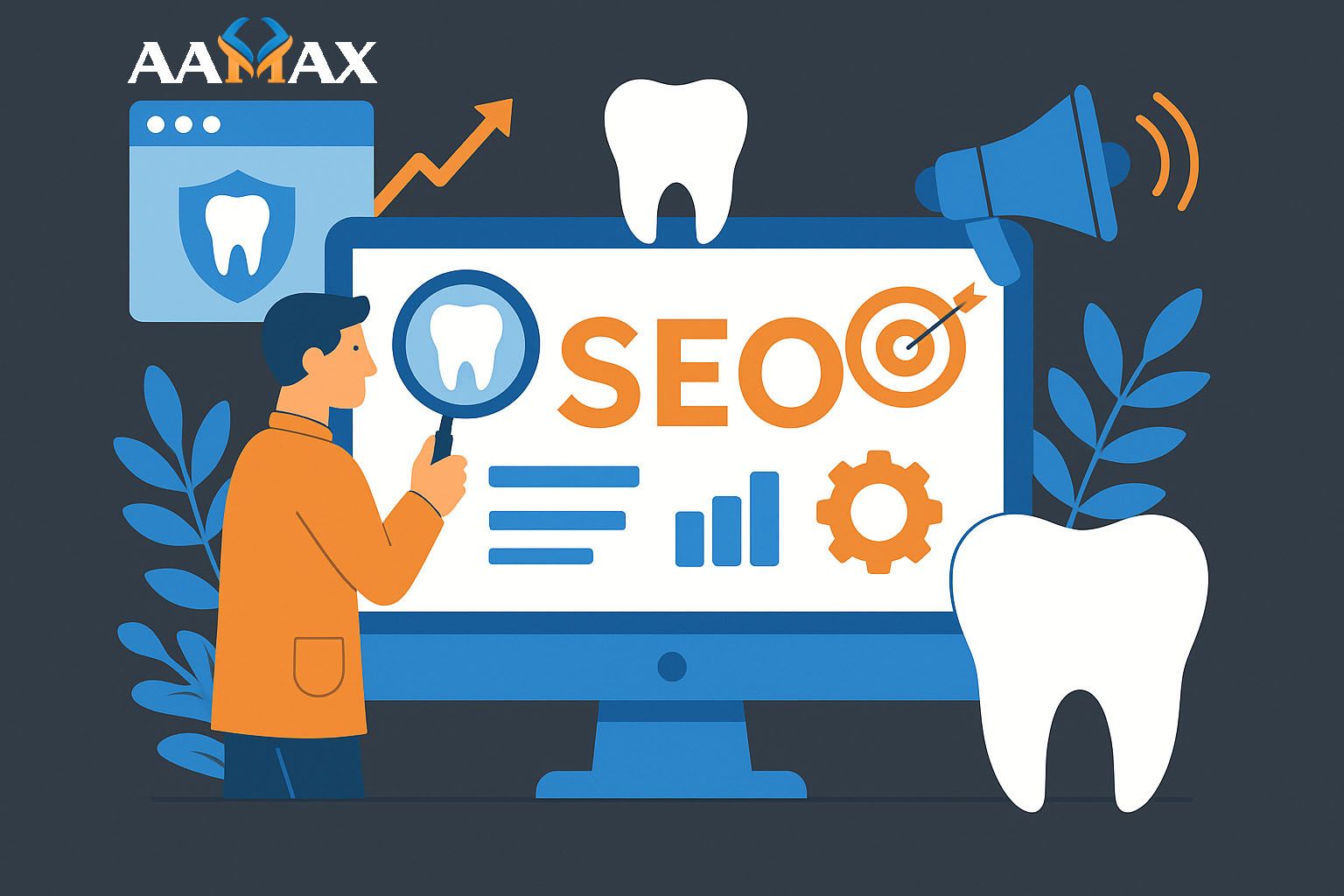
Dental SEO Services – SEO Tips for Dentists
In today's digital-first world, having a beautiful dental website is no longer enough to attract patients. The real game-changer? Search Engine Optimization (SEO). With thousands of dental practices competing for attention online, leveraging dental SEO services has become a necessity, not a luxury. This guide will provide actionable SEO tips for dentists, show you why SEO matters, and help you decide whether hiring a professional like AAMAX is right for you.
What is Dental SEO?
Dental SEO refers to the process of optimizing a dental practice’s website to improve its visibility on search engines like Google. The goal is to attract more organic traffic by ranking higher for keywords that potential patients are searching for, such as “dentist near me,” “emergency dentist,” or “teeth whitening.”
SEO for dentists focuses on local SEO, content marketing, technical optimization, and reputation management—all tailored to the healthcare industry.
Why SEO Matters for Dentists
Before diving into the how-tos, let’s talk about the “why.”
1. Patients Use Search Engines to Find Dentists
Over 70% of people turn to Google when looking for health-related information or local medical services. If your dental clinic doesn’t appear on the first page of results, you’re missing out on a huge volume of potential patients.
2. SEO Offers a High ROI
Unlike paid ads, the benefits of SEO are long-term. A well-optimized website continues to attract organic traffic without recurring ad spend.
3. Build Trust and Authority
Ranking high in Google not only gets you visibility—it also earns trust. Most users equate top rankings with industry authority and credibility.
Core Components of Dental SEO
Now that you understand why SEO is important, let’s dig into its core components and actionable strategies.
1. Keyword Research for Dentists
Keyword research is the foundation of any SEO strategy. Here’s how to do it effectively:
- Target local intent: Keywords like “best dentist in [City]” or “dental implants [City]” are essential.
- Use keyword tools: Tools like Google Keyword Planner, Ubersuggest, and SEMrush can help identify high-volume, low-competition keywords.
- Patient-centric terms: Think like a patient. Instead of using medical jargon, go for keywords like “toothache relief,” “braces for teens,” etc.
Pro Tip: Include both short-tail (e.g., "dentist") and long-tail keywords (e.g., "affordable emergency dentist in Austin").
2. On-Page SEO for Dental Websites
On-page SEO involves optimizing individual pages on your site to rank higher and earn more relevant traffic.
Title Tags and Meta Descriptions
- Include your primary keyword.
- Keep it under 60 characters for titles and 155 characters for meta descriptions.
Header Tags (H1, H2, H3)
- Use H1 for the main topic.
- Structure content with H2 and H3 tags for subtopics.
- Use keywords naturally in these headers.
Content Optimization
- Write for patients, not Google.
- Include FAQs and pain points.
- Keep paragraphs short and use bullet points for better readability.
Image Optimization
- Use alt text that describes the image and includes keywords.
- Compress images for faster load times.
3. Local SEO: The Secret Weapon for Dentists
Since dental services are inherently local, Local SEO is crucial.
Google Business Profile
- Claim and optimize your Google Business Profile.
- Add business hours, address, phone number, services, and photos.
- Encourage and respond to reviews.
Local Listings and Citations
- Get listed on directories like Yelp, Healthgrades, Zocdoc, and local chambers of commerce.
- Ensure NAP (Name, Address, Phone Number) consistency across all platforms.
Location Pages
- Create separate landing pages for each location you serve.
- Include maps, contact info, and locally relevant content.
4. Content Marketing for Dental SEO
Content is king—but in the dental niche, it's patient education that reigns supreme.
Blogging
- Topics can include “How to Overcome Dental Anxiety,” “5 Reasons You Need a Dental Checkup,” or “Veneers vs. Crowns.”
- Post consistently (at least once a month).
- Use a conversational tone to build trust.
Video Content
- Explainers about procedures.
- Staff introductions to build rapport.
- Office tours to reduce anxiety.
FAQ Pages
- Add a page with frequently asked questions like:
- “Does dental insurance cover implants?”
- “What to expect during a root canal?”
This not only helps users but also targets featured snippet opportunities on Google.
5. Technical SEO: Behind-the-Scenes Optimization
Even the best content won’t rank if your website isn’t technically sound.
Mobile Responsiveness
- Over 60% of traffic is mobile.
- Your site must look and function well on all devices.
Site Speed
- Use tools like Google PageSpeed Insights to analyze and improve load times.
- Compress images, use caching, and minimize code.
Secure Socket Layer (SSL)
- Your website must be HTTPS secured.
- This builds trust and is a confirmed ranking factor.
Schema Markup
- Add LocalBusiness schema to help Google understand your business.
- Use FAQ schema for frequently asked questions to win rich snippets.
6. Reputation Management and Reviews
Online reviews not only influence patient decisions but also impact your local SEO.
How to Get More Reviews
- Ask satisfied patients to leave reviews.
- Send follow-up emails with a review link.
- Use QR codes in the office.
Respond to All Reviews
- Thank users for positive feedback.
- Address negative reviews professionally and calmly.
Platforms That Matter
- Google is #1.
- Also focus on Yelp, Healthgrades, and Facebook.
7. Link Building for Dentists
Backlinks (links from other websites to yours) are a major ranking factor.
Local Link Building Tactics
- Partner with local businesses or health organizations.
- Sponsor community events and request backlinks in return.
- Get featured in local news outlets.
Guest Blogging
- Write for healthcare blogs or dental news websites.
- Include a link back to your site in your author bio.
Dental Associations
- Get listed on dental directories and professional association websites like the ADA.
8. Tracking and Analytics
If you're not measuring, you're guessing.
Use These Tools:
- Google Analytics: Understand user behavior.
- Google Search Console: Monitor keyword performance and site health.
- Local Falcon or BrightLocal: Track local rankings.
KPIs to Watch
- Organic traffic volume.
- Keyword rankings.
- Conversion rate (calls, form fills, appointments).
- Bounce rate and session duration.
DIY vs Hiring a Professional: Which is Right for You?
While it's possible to handle SEO on your own, it’s time-consuming and requires ongoing education. If you prefer focusing on patient care while leaving the technical stuff to pros, hiring a digital marketing agency is your best bet.
Why Hire AAMAX for Dental SEO Services?
AAMAX is a full-service digital marketing company that specializes in:
- Web Development
- Search Engine Optimization
- Digital Marketing
With years of experience and a results-driven approach, AAMAX helps dental clinics build strong online visibility, attract new patients, and grow revenue.
What Makes AAMAX Different?
- Customized SEO Strategies tailored to your location and services.
- Transparent Reporting so you know exactly how your campaign is performing.
- Full-Suite Services from web design to SEO to paid ads—under one roof.
Ready to elevate your dental practice?
Hire AAMAX today and watch your practice thrive online.
Final Thoughts
SEO for dentists isn’t optional anymore—it’s a vital part of growing a successful, patient-focused practice. By following the tips above and optimizing your site for both search engines and real people, you can dramatically improve your online presence.
And if you want to skip the learning curve and get professional results faster, trust the experts at AAMAX. Your future patients are searching for you—make sure they find you.







